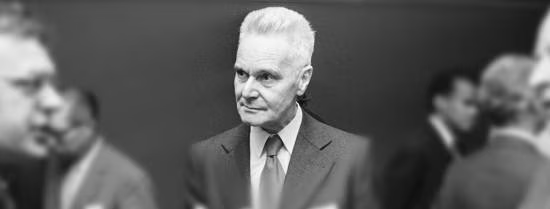Jan Tinbergen continues to inspire economists at Erasmus University Rotterdam and beyond. His research also raises difficult philosophical questions about expertise, economic methods, and popular ideas like "sustainability" and "fairness". Erwin Dekker's book "Jan Tinbergen and the Rise of Economic Expertise" gives us insights into Tinbergen's challenging thoughts and the man behind them.
“The Erasmus School of Economics is still working in the tradition of Jan Tinbergen.” – Philip Hans Franses.
Jan Tinbergen was the first recipient of a Nobel Prize in Economics, with Ragnar Frisch in 1969. He was one of the most influential economists of the 20th century. Tinbergen shaped econometrics, economic modelling, and the study of fairness. Yet many of his ideas are alien to us today, which makes him a hard economist to understand and also a thought-provoking thinker to read.
On Monday 21/06, EUR was honoured to host a book launch for Erwin Dekker's biography "Jan Tinbergen and the Rise of Economic Expertise". The participants were James Heckman, Esther-Mirjam Sent, Philip Hans Franses, and Erwin Dekker. It was moderated by Arjo Klamer, professor of cultural economics at EUR. There was a talk by Heckman (a winner of the 2000 Nobel Prize in Economics, who described Tinbergen as a “blood brother”) on Tinbergen's tremendous influence on econometrics. This was followed by a panel discussion. This article highlights some of the many high points of the discussion, and a video of the full book launch can be watched at the bottom of this page.
“Tinbergen’s sense of duty to the wider world motivated him.” – James Heckman
We are extremely familiar today with social scientists saying that they are inspired by global responsibility. However, as Heckman explained, Tinbergen did not see his scientific role as the production of polemics, activism, or even advocacy. Instead, Tinbergen believed that he could best contribute by studying major social issues and finding ways of combining the best ideas from all sides of the debates. As Dekker put it, Tinbergen’s pacifist international politics also influenced his approach to economics: even in hot-headed controversies, he always sought the peaceful and synthetic solution.
Whether it was helping to create modern macroeconomics in the 1930s during the Great Depression or his research in the early days of environmental economics, Tinbergen entered into the controversies with a sense of empiricism and open-mindedness. He did not assume that he had all the answers, and he was willing to listen to conservative thinkers, Marxist thinkers, and those in between. More or less everyone in universities these days says that they are inspired by global responsibility, but Tinbergen engaged with the big social questions in a way that is neither obvious nor easy.
“Tinbergen had one defining standard: you had to be able to measure it!” – Erwin Dekker
We find many of the greatest questions of our time in Tinbergen’s work. How can we have sustainable growth? How can we stabilise the economy? What is an economically fair society?
Yet Tinbergen was a physicist before he was an economist, and he always maintained an emphasis on measurability. Today, we use the word “sustainability” a lot, but what do we mean by it? Tinbergen thought that, if the pursuit of sustainability was to be integrated into quantitative policy choices alongside measures like GDP per capita and inflation, then we would have to define sustainability in a measurable way. In his book, Dekker provides the fascinating story of how Tinbergen’s emphasis on measurement conflicted with his own attachment to the qualitative and humane parts of life, such as how Tinbergen – an advocate of emancipatory education – reduced education’s role in economic development to simple measures of years of schooling and their impact on quantities like GDP.
“Tinbergen had an influence on the institutional landscape in the Netherlands” – Esther-Mirijam Sent
Along with a few other countries, like Denmark, economic experts have an unusually strong influence in Netherlands politics. As Dekker describes in the book, Tinbergen was a key figure in both creating the institutions of Dutch policymaking and the attitudes of deference towards non-partisan experts that gives these institutions such power. Tinbergen thought that economic experts could liberate social policy from the failed dogmatism of politicians prior to World War II. However, Dekker also explains how Tinbergen found that scientific expertise could not easily transcend politics, when Tinbergen collided with political realities as an advisor in Turkey in the early 1950s.
“Do we need more expertise or more listening?” – Erwin Dekker
Philosophers and historians of economics have only begun to explore Tinbergen’s ideas and the challenges that they raise. In addition to Dekker’s book, their is now a project [Jan Tinbergen: The Thinker] at the Erasmus Institute for Philosophy and Economics (EIPE). Already in his lifetime, people recognised Tinbergen’s importance for the development of economics, but it is only now that his ideas and influence is starting to be properly understood.

- Researcher
- More information
The project "Jan Tinbergen: The Thinker" is funded jointly by the Stichting Erasmus Trustfunds, Erasmus School of Economics, Erasmus School of Philosophy, and the Erasmus Initiative “Dynamics of Inclusive Prosperity”.
- Related content
- Related links
- Research Project - Jan Tinbergen: Thinker

